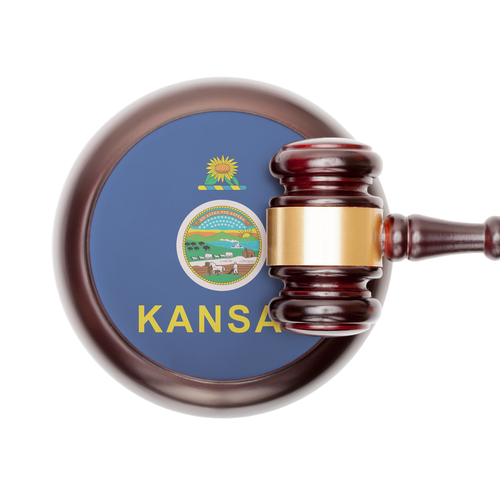Self-defense law doesn't protect officer who shot at charging dog and injured child, top state court rules

Image from Shutterstock.
A Kansas law allowing the use of deadly force against an aggressor does not protect people defending themselves who act recklessly and harm a bystander, the state’s top court has ruled.
The Kansas Supreme Court ruled July 29 in the case of Dexter Betts, a Wichita, Kansas, police officer who fired two gunshots at a fast-approaching dog while at a home responding to a domestic violence call.
The bullets missed the dog and struck the floor. Bullet fragments struck a girl sitting on the living room floor in front of a couch, near the advancing dog. The fragments struck above her eye and on a toe.
Betts was charged with reckless aggravated battery. Betts had argued that the charge should be dismissed because his use of force was justified, and the unintended harm to a bystander should not change his entitlement to immunity.
The Kansas Supreme Court disagreed, ruling that the case may proceed against Betts if the state is able to show probable cause that the shooting was reckless.
The state supreme court based its ruling on a Kansas law on self-defense.
The law grants immunity to those who use force against another person’s imminent use of unlawful force. But it says nothing about immunity for unintentional injury to an innocent bystander who was not reasonably perceived as an attacker, the state supreme court said in a decision by Judge Dan Biles.
“If the legislature wishes to extend self-defense immunity when an innocent bystander is hurt, it can do so,” Biles wrote.
The Kansas Supreme Court said its decision is in line with most states that have addressed the innocent-bystander issue by statute or caselaw.
In states providing a statutory self-defense privilege for unintended harm to a bystander, the protection is not absolute. The statute allow bystander protection when a person acts “with usual and ordinary caution,” or they don’t give protection when a person acts recklessly or negligently.
In states with caselaw on the subject, 13 allow a self-defense privilege for bystander harm, but they have held or have at least suggested that reckless actions aren’t protected.
“Pennsylvania is an outlier” in that it protects reckless acts in self-defense that harm an innocent bystander, the state supreme court said.
The Associated Press had coverage of the Kansas decision. The publication spoke with Betts’ lawyer, Jess Hoeme, who said he thinks that Betts will be acquitted. Hoeme said the Kansas Supreme Court decision could endanger officers who will “second-guess their own actions” in response.



